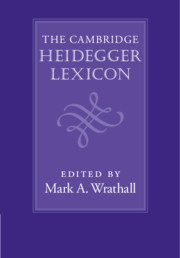Book contents
- The Cambridge Heidegger Lexicon
- Series page
- The Cambridge Heidegger Lexicon
- Copyright page
- Contents
- Contributors
- Preface
- Acknowledgments
- Using the Lexicon
- Chronology of Martin Heidegger
- Abbreviations for Heidegger’s Works
- A
- 1. Abandonment of Being (Seinsverlassenheit)
- 2. Ability-to-be (Seinkönnen)
- 3. Abyss (Abgrund)
- 4. Actuality (Wirklichkeit)
- 5. Actualization (Vollzug)
- 6. Adaptation (Ereignis)
- 7. Affordance (Bewandtnis)
- 8. Alêtheia
- 9. Anxiety (Angst) and Fear (Furcht)
- 10. Anyone, the (Das Man)
- 11. Appearance (Erscheinung)
- 12. Apperception (Apperzeption)
- 13. Art (Kunst)
- 14. Articulation (Artikulation)
- 15. As-structure (Als-Struktur)
- 16. Assertion (Aussage)
- 17. Authenticity (Eigentlichkeit)
- 18. Availableness (Zuhandenheit)
- 19. Averageness (Durchschnittlichkeit)
- 20. Awaiting (Gewärtigen)
- B
- C
- D
- E
- F
- G
- H
- I
- J
- K
- L
- M
- N
- O
- P
- R
- S
- T
- U
- V
- W
- German–English Glossary
- Bibliography
- Index
1. - Abandonment of Being (Seinsverlassenheit)
from A
Published online by Cambridge University Press: 17 April 2021
- The Cambridge Heidegger Lexicon
- Series page
- The Cambridge Heidegger Lexicon
- Copyright page
- Contents
- Contributors
- Preface
- Acknowledgments
- Using the Lexicon
- Chronology of Martin Heidegger
- Abbreviations for Heidegger’s Works
- A
- 1. Abandonment of Being (Seinsverlassenheit)
- 2. Ability-to-be (Seinkönnen)
- 3. Abyss (Abgrund)
- 4. Actuality (Wirklichkeit)
- 5. Actualization (Vollzug)
- 6. Adaptation (Ereignis)
- 7. Affordance (Bewandtnis)
- 8. Alêtheia
- 9. Anxiety (Angst) and Fear (Furcht)
- 10. Anyone, the (Das Man)
- 11. Appearance (Erscheinung)
- 12. Apperception (Apperzeption)
- 13. Art (Kunst)
- 14. Articulation (Artikulation)
- 15. As-structure (Als-Struktur)
- 16. Assertion (Aussage)
- 17. Authenticity (Eigentlichkeit)
- 18. Availableness (Zuhandenheit)
- 19. Averageness (Durchschnittlichkeit)
- 20. Awaiting (Gewärtigen)
- B
- C
- D
- E
- F
- G
- H
- I
- J
- K
- L
- M
- N
- O
- P
- R
- S
- T
- U
- V
- W
- German–English Glossary
- Bibliography
- Index
Summary
Abandonment of being means at the same time both our abandoning being by covering up being as a condition that lets being be, and (reading the genitive the other way) it also means the abandonment of us by being as being withdraws from us. Since everything we do is really a response to being, these two add up to pretty much the same thing for Heidegger. Being has abandoned us by abandoning entities, a strange idea since we and entities always have to have being as long as we are. The best way to approach this idea is to see it as an adaptation of a central notion in Kant’s and Husserl’s thought. Perhaps the main insight in Kant’s first Critique and Husserl’s work in general is that despite how it appears, we don’t just open our eyes and find reality laid out before us, imposing itself on our consciousness by bumping into us; this kind of empiricist realism amounts to naiveté or dogmatism. Their discovery was that a great deal goes into the having of an experience, much of it on the part of consciousness.
- Type
- Chapter
- Information
- The Cambridge Heidegger Lexicon , pp. 3 - 6Publisher: Cambridge University PressPrint publication year: 2021

